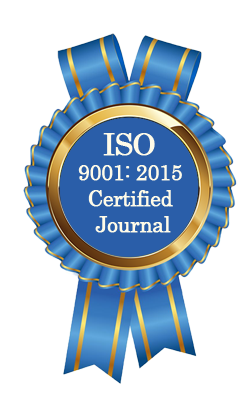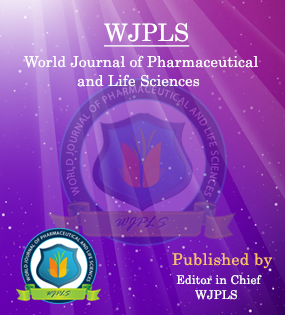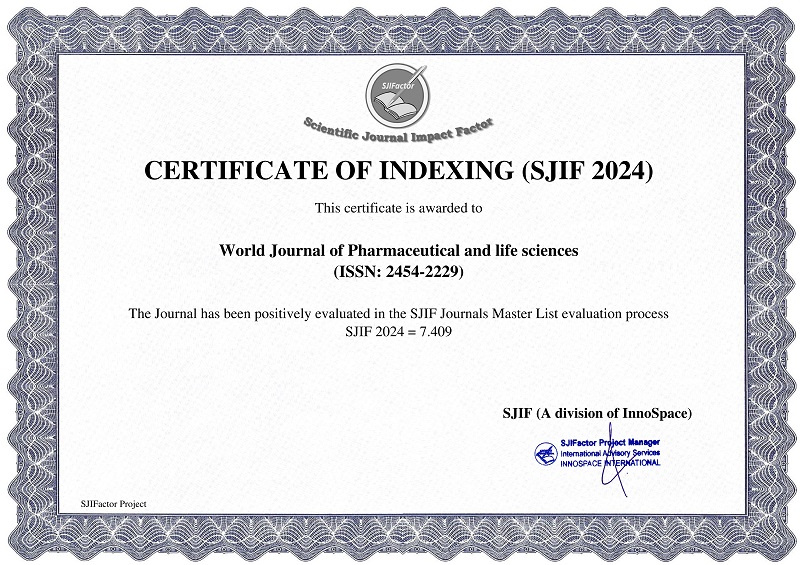Abstract
DIGOXIN INTERACTIONS WITH MEDICATIONS USED IN CONGESTIVE HEART FAILURES AND OTHER CO-MORBID DISEASES: AN IDENTIFICATION OF PATIENTS REQUIRING CONSTANT DRUG THERAPY MONITORING AND VIGILANCE
*John David Ohieku and Muhammad Al-amin Usman
ABSTRACT
Background: Digoxin has narrow therapeutic index and many drug combinations are capable of affecting both its pharmacokinetic and pharmacodynamics profile, which may lead to lethal outcomes. Objectives: The objectives were to assess potential interactions between digoxin and other medications and to evaluate its degree, clinical outcomes as well as identify patients that may require constant monitoring and vigilance. Methods: The cross-sectional and prospective study involves the evaluation of digoxin interaction with other medications using online drug interaction software checkers developed by Medscape.com, Drug.com, Drugbank.com and Epocrates. Patients were sampled from both out-patients department during clinic visits and also hospitalized In-Patients. Results: Digoxin was recommended to 71(31.1%) patients and combined with loop diuretic in 51(22.4%) cases and other combinations such as potassium sparing diuretics 44(19.3%), thiazide diuretics 11(4.8%), carvedilol 43(19.7%), ACEI 35(15.4%), ARB 9(3.9%), calcium channel blocker 6(2.6%), anti-platelets 15(6.6%), and with statins, antacid and calcitriol in 5(2.2%) proportion each; and with anti-gout/arthritis medications 3(1.3%). Digoxin co-use in patients with other co-morbidities was significantly different from similar patients who do not use digoxin in hypertension (X2=17.38; P<0.001); anaemia (x2=4.97, p=0.026); CKD (x2=10.37, p<0.001) and stroke (x2=10.54, p<0.001). A cumulative total of 574 interactions were identified in the study. Carvedilol and spironolactone accounted for the highest multiple of interactions (being 4 each). Atenolol has tripled multiple interactions with digoxin while bendroflumethiazide, calcium carbonate, furosemide and aspirin were all in the multiple of 2 each. A total of 239 (41.6%) interactions were pharmacokinetics in nature while 335 (58.4%) are pharmacodynamics. Carvedilol 129(54.0%) accounted for the majority of pharmacokinetic interactions while furosemide 102(30.4%) accounted for majority of pharmacodynamics interactions. Of the 239 pharmacokinetics interactions, absorption, metabolism and excretion accounted for 48(20.1%), 54(22.6%) and 137(57.3%) respectively and for the 335 pharmacodynamics interactions; potentiation, synergism/addictive and antagonistics interactions accounted for 52 (15.5%), 219(65.4%) and 64(19.1%) respectively. The clinical outcome arising from the interactions are increase in serum levels of digoxin 121(19.5%), increase in digoxin effects through synergism 61(9.8%), increased bradycardiac effects 24(7.2%), enhanced AV block 6(1.0%), enhanced arrhythmogenic effects 5(0.8%), false elevation in digoxin assay 10(1.6%), enhanced adverse effects/toxicity of digoxin 62(10.0%), decreased therapeutic effects of digoxin 44(7.1%), decreased excretion of digoxin 90(14.5%), decreased metabolism of digoxin 51(8.2%), increased K+ levels 18(6.2%) and other electrolytes problems 62 (10.0%). Several interventions will be needed such as monitoring digoxin 154(50.3%), dose reduction by 15-30% of digoxin 98(32.0%) or even by 30-50% 29(9.5%), exercising caution in digoxin use 5(1.6%), and total avoidance or use of alternative agents 10(3.3% each). Conclusion: Several clinical outcomes resulting from digoxin interactions are capable of causing serious untoward adverse effects and toxicity to several patients. Many interactions from the combinations are rated serious and should have been avoided while others are moderately significant. These patients would therefore requires several therapeutic approach such as decreasing the dose of digoxin, monitoring the levels, monitoring toxicity and ECG monitoring as well symptomatic monitoring.
[Full Text Article] [Download Certificate]WJPLS CITATION 
| All | Since 2020 | |
| Citation | 590 | 424 |
| h-index | 12 | 10 |
| i10-index | 17 | 14 |
INDEXING
NEWS & UPDATION
BEST ARTICLE AWARDS
World Journal of Pharmaceutical and life sciences is giving Best Article Award in every Issue for Best Article and Issue Certificate of Appreciation to the Authors to promote research activity of scholar.
Best Article of current issue
Download Article : Click here





